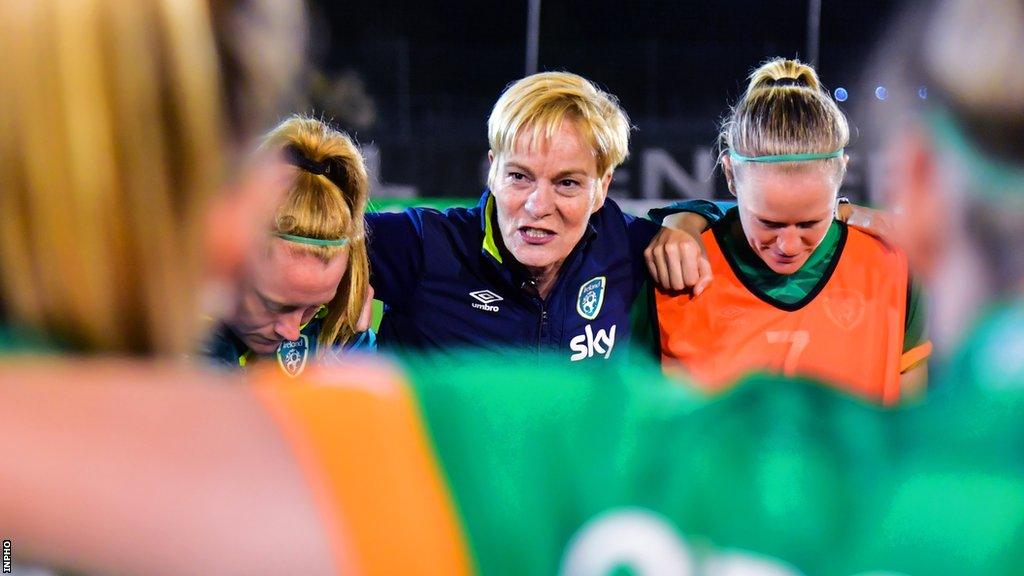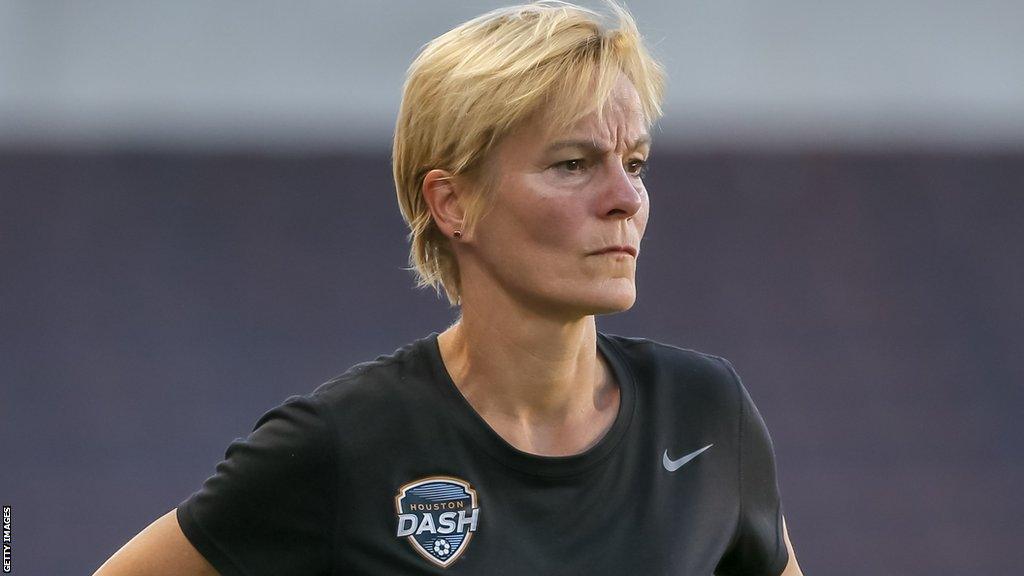Vera Pauw: Republic of Ireland boss rejects fresh misconduct claims
- Published

Vera Pauw has guided the Republic of Ireland to this summer's World Cup - the country's first major tournament
Republic of Ireland manager Vera Pauw has strenuously denied fresh allegations that have emerged about her conduct while in charge of US team Houston Dash.
A number of ex-Dash players and staff told The Athletic, external that Pauw body shamed players and behaved inappropriately during her time in charge in 2018.
Allegations about Pauw's time in Houston first surfaced last December when she was named in a report on misconduct in the National Women's Soccer League in the US.
That report said Pauw had "shamed players for their weight" and "attempted to exert excessive control over eating habits".
Pauw strongly rejected those claims, which she described as an "insult to my personal values", and received strong backing from her current employers the Football Association of Ireland.
The Dutchwoman has guided the Republic of Ireland to this year's World Cup, which will be the first time the country competes at a major women's finals.
Pauw alleges she received death threat
Pauw's denial of the latest accusations in The Athletic report also included an allegation of her own that she received a death threat from a staff member unhappy at her decision to move training from mornings to evening to avoid extreme heat - something the men's team had already done.
"He threatened to shoot me in the head as I was taking his beer night away," she said.
Pauw said she received police protection until the matter was resolved and also promised her husband that she would not extend her contract in Houston beyond the 2018 season.
The Athletic report, which was published on Monday, contained anonymous accounts from four former Dash players and three ex-staff who were at the club during Pauw's season in charge.
The accusations included a claim that Pauw had grabbed a staff member around the "neck or collarbone" in one incident, in addition to regularly commenting on players' size and weight.

Vera Pauw had a single season in charge of Houston Dash in 2018
Player 'developed eating disorder'
It was alleged that Pauw's comments on one former player's relationship with food and exercise contributed to them developing an eating disorder and becoming physically unable to play football.
"Throughout the year… she was losing so much weight," said another player.
"And Vera would praise her… 'you look so good, you look so fit'. But it was getting to a point where it was not healthy.
"She ended up having to quit soccer because she couldn't play anymore and Vera would not listen."
Pauw strongly rejected the claims, saying she never praised the player for weight loss and did not comment on her fitness testing results.
"How can I praise her for weight loss if I don't know her weight?", said the Republic of Ireland manager.
"Of course, it's awful what happened to her. But that has nothing to do with me."
Physical abuse allegations denied
Pauw also denies physically grabbing a staff member on two separate occasions as alleged by witnesses in the Athletic investigation.
"I've never been physically aggressive in my whole life to anyone, even as a kid," Pauw insisted.
In the wide-ranging investigation, it is claimed that Pauw made disparaging comments about certain nationalities which she based on a theory of cultural dimensions put forward by Dutch psychologist Geert Hofstede, and labelled Americans as "selfish" and the English as "arrogant".
Pauw denied these and said: "'Selfish' is not a word I'm using."
"I said 'Dutch people like me are very direct' and I put different countries and different cultures into that theory. I didn't make it up, I just showed what the theory brought — an internationally highly respected theory on intercultural dimensions.
"Players after the meeting came to me and said: 'This was very interesting. I wish we knew this before'."
If you, or someone you know, have been affected by any issues raised in this article, support and information is available at BBC Action Line. You can also contact the Samaritans on a free helpline at 116 123, or visit the website., external